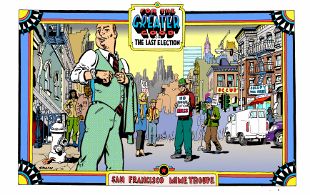DRAT THAT UNAPPRECIATIVE 99%
For a good marriage of politics and theatre – pure melodrama, bull’s-eye political satire, a live band and zapping social commentary all served up by amazingly versatile actors – go (with almost the same urgency as you would to vote) to the San Francisco Mime Troupe’s For the Greater Good, or The Last Election, which is traveling around the Bay Area for the summer (including the East Bay, Sacramento, Ukiah, Nevada City, and more)
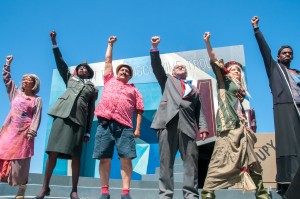 For the Greater Good pits bombastic banker Gideon Bloodgood against black-caped Damien Landless amid a colorful cast of Everyman personalities. Pinched by the Crash of 1987, Banker Bloodgood is handed an enormous deposit by the good Captain Algood Fairweather but the upright Captain suddenly dies. This leaves the dubiously aristocratic banker with a choice: does he provide for the Captain’s needy family or does he repurpose the funds for his own purposes, including restoring national faith in the free market? The show will forward 25 years to see what he does.
For the Greater Good pits bombastic banker Gideon Bloodgood against black-caped Damien Landless amid a colorful cast of Everyman personalities. Pinched by the Crash of 1987, Banker Bloodgood is handed an enormous deposit by the good Captain Algood Fairweather but the upright Captain suddenly dies. This leaves the dubiously aristocratic banker with a choice: does he provide for the Captain’s needy family or does he repurpose the funds for his own purposes, including restoring national faith in the free market? The show will forward 25 years to see what he does.
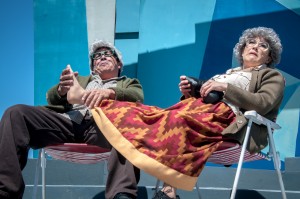 That’s the stuff of pure melodrama, which is delightful enough, but thanks to writer/director Michael Gene Sullivan’s clever way with words and ideas, this show offers a thought-provoking edge, as it is shot through with biting and pertinent commentary: in this lampoon, it’s the 99 percent who are culpable for the world’s misery. Occupiers turn up right and left, but when you’re a banker with a windfall and fallen morals, fair play is treated like the nuisance it is. Why doesn’t that rabble-rousing 99 percent appreciate trickle-down economics? Those poor billionaires! Generating all that money, and getting nothing but grief for it! This musical satire will warm the cockles of any greedy industrialist.
That’s the stuff of pure melodrama, which is delightful enough, but thanks to writer/director Michael Gene Sullivan’s clever way with words and ideas, this show offers a thought-provoking edge, as it is shot through with biting and pertinent commentary: in this lampoon, it’s the 99 percent who are culpable for the world’s misery. Occupiers turn up right and left, but when you’re a banker with a windfall and fallen morals, fair play is treated like the nuisance it is. Why doesn’t that rabble-rousing 99 percent appreciate trickle-down economics? Those poor billionaires! Generating all that money, and getting nothing but grief for it! This musical satire will warm the cockles of any greedy industrialist.
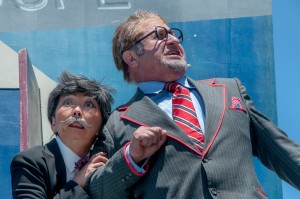 Rooted in the 1857 melodrama The Poor of New York (brought to brutal life on the screen in Martin Scorsese’s The Gangs of New York), this more lighthearted incarnation still has some bite to it. It honors its predecessors by giving a nod to edgy realities like homelessness while indulging in the gleefully over-the-top fun of melodrama, in which actors perfectly render effects like eye-rolling or chorused shouts of “Gasp!” Blake More’s costuming reflects the tone of the play (one character wears a Hawaiian shirt as imagery of leisure), while a live band does more than justice to the traditional dramatic piano passages from turn-of-the-century melodramas (musical direction by Pat Moran). As befitting our current political climate, I caught the show in the Redwood City Courthouse Square on a sunny but chilly weekday afternoon.
Rooted in the 1857 melodrama The Poor of New York (brought to brutal life on the screen in Martin Scorsese’s The Gangs of New York), this more lighthearted incarnation still has some bite to it. It honors its predecessors by giving a nod to edgy realities like homelessness while indulging in the gleefully over-the-top fun of melodrama, in which actors perfectly render effects like eye-rolling or chorused shouts of “Gasp!” Blake More’s costuming reflects the tone of the play (one character wears a Hawaiian shirt as imagery of leisure), while a live band does more than justice to the traditional dramatic piano passages from turn-of-the-century melodramas (musical direction by Pat Moran). As befitting our current political climate, I caught the show in the Redwood City Courthouse Square on a sunny but chilly weekday afternoon.
The fun twists in this melodrama are captured more than well by an astonishing cast. As bald banker Bloodgood, portly in a spotless beige suit, Ed Holmes catches amazing depths of sincerity in his belief in his way of life; his performance validates that the heroic figure of Damien Landless is played as the villain. Reggie D. White is a joy to watch as Occupier Landless, the leader of the Occupy movement; White’s heroic figure lithely skulks about the stage, relishing every twirl of his black cape.
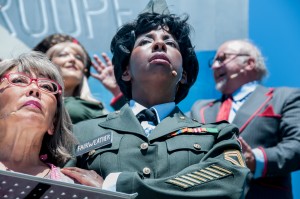 Lisa Hori-Garcia is splendid as both blonde-haired, spoiled Alida Bloodgood, who becomes the stalwart revolutionary Tanya (an effective name choice for those who remember Patty Hearst); Ms. Hori-Garcia is resourceful enough as to be unrecognizable as grandmotherly Mrs. Puffy, who totters about braving the recession with Mr. Puffy, played by Victor Toman, who also shows considerable character skills as Jack Badger, the occasional narrator. Not only does Velina Brown convince as the cheated Captain Fairweather, but the stunningly versatile actress also nabs the spirit of intentions gone awry as his daughter, Lucy Fairweather. Rounding out the cast with her own brand of melodramatic authenticity is Keiko Shimosato-Carreiro as Mrs. Fairweather, a character who faces adversity by serving up social commentary in the plate of cookies she never stops passing around. It was with a pleasant sense of shock that only a handful of actors appeared at the curtain call, as they nailed such a palette of characters.
Lisa Hori-Garcia is splendid as both blonde-haired, spoiled Alida Bloodgood, who becomes the stalwart revolutionary Tanya (an effective name choice for those who remember Patty Hearst); Ms. Hori-Garcia is resourceful enough as to be unrecognizable as grandmotherly Mrs. Puffy, who totters about braving the recession with Mr. Puffy, played by Victor Toman, who also shows considerable character skills as Jack Badger, the occasional narrator. Not only does Velina Brown convince as the cheated Captain Fairweather, but the stunningly versatile actress also nabs the spirit of intentions gone awry as his daughter, Lucy Fairweather. Rounding out the cast with her own brand of melodramatic authenticity is Keiko Shimosato-Carreiro as Mrs. Fairweather, a character who faces adversity by serving up social commentary in the plate of cookies she never stops passing around. It was with a pleasant sense of shock that only a handful of actors appeared at the curtain call, as they nailed such a palette of characters.
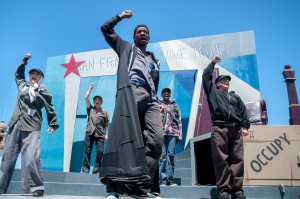 Sullivan doesn’t use his play for political name-calling to transmit its message (we only hear politicos such as “Romney” in passing). Clever touches, such as Mrs. Fairweather’s ubiquitous plate of cookies, and deft tongue-in-cheek character names (Bloodgood, Landless) further the point of the play in subtle but inarguable ways.
Sullivan doesn’t use his play for political name-calling to transmit its message (we only hear politicos such as “Romney” in passing). Clever touches, such as Mrs. Fairweather’s ubiquitous plate of cookies, and deft tongue-in-cheek character names (Bloodgood, Landless) further the point of the play in subtle but inarguable ways.
If you’re on top of politics and social trends, this play, besides being a delightful feast for the eyes, is a good one to sit back and enjoy. It doesn’t, however, avoid taking a glaring look at “the greater good” we hear bandied about in our everyday world, who is defining it, and why.
photos by Fletcher Oakes
poster design by Spain Rodriguez
For the Greater Good, or The Last Election
San Francisco Mime Troupe at various Bay Area locations
scheduled to end on September 9, 2012
for tickets and locations, visit http://www.sfmt.org
